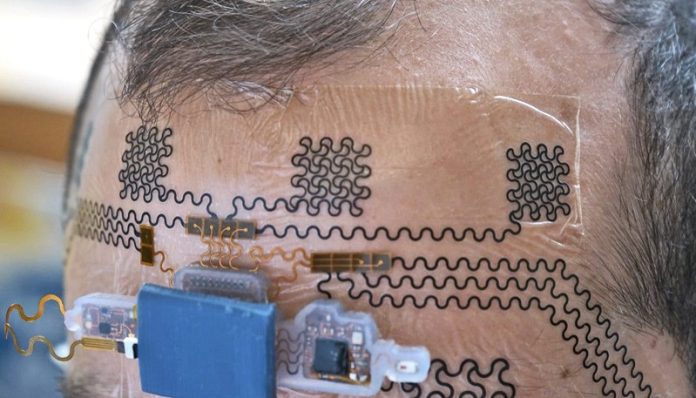
A team of researchers has developed a high-tech “electronic tattoo” that sticks to the forehead and tracks mental strain in real time—offering a game-changing way to monitor cognitive health, especially for people working in high-stress jobs.
This new wearable device could benefit air traffic controllers, surgeons, long-haul truck drivers, and other professionals who need to stay sharp under pressure.
The goal is to help detect mental overload before it leads to errors, which in some jobs can have serious consequences.
“Technology is advancing faster than we can adapt, and our brains can easily become overloaded,” said Nanshu Lu, co-lead author of the study and a professor at The University of Texas at Austin.
“Everyone has their own sweet spot of mental workload where they perform best, and this device helps find that balance.”
Right now, mental workload is usually measured by surveys like the NASA Task Load Index, which rely on workers filling out forms after completing a task. This method is slow, subjective, and doesn’t give real-time data.
The new forehead e-tattoo offers a better alternative by directly analyzing brain and eye signals—specifically, electroencephalography (EEG) and electrooculography (EOG).
Unlike traditional EEG caps, which are bulky, covered in wires, and need sticky gel to work, the e-tattoo is paper-thin and flexible. It’s powered by a small battery pack and contains stretchable sensors that mold to the skin for comfort and strong signal quality. The sensors are custom-made for each person based on their facial shape to ensure accurate placement.
The research team tested the e-tattoo on six people doing a memory task that became harder over time.
As the challenge increased, participants showed specific changes in brain activity that signaled rising mental effort and fatigue. Not only could the device detect mental strain, but a computer model trained with the data could also predict when a person was entering a mentally fatigued state.
One major benefit of the device is its affordability. While traditional EEG systems can cost over $15,000, this new system uses a $200 battery and chip, with $20 disposable sensors. This could make it widely accessible in workplaces, schools, or even at home.
Co-author Luis Sentis from UT Austin hopes to see the e-tattoo become a common tool for monitoring mental health and performance. The team is also working on new versions that work with ink-based sensors for use on the scalp, expanding the device’s reach.
As Sentis explains, “We’ve been tracking physical strain for years. Now, for the first time, we can track mental strain, too—and that could change how we care for workers’ overall well-being.”



